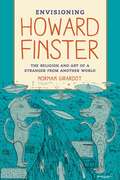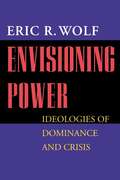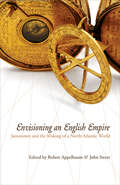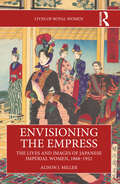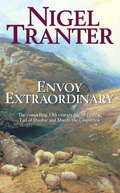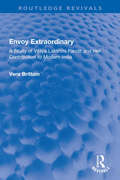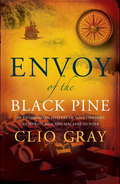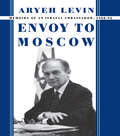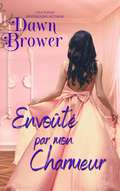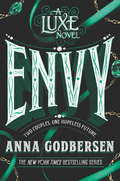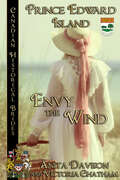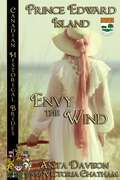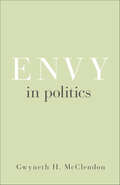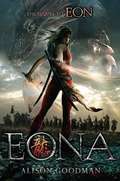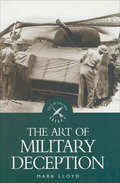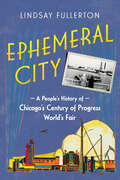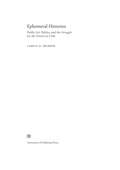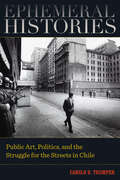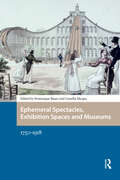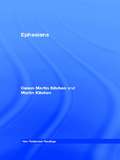- Table View
- List View
Envisioning Howard Finster: The Religion and Art of a Stranger from Another World
by Norman GirardotThis book explores the life and religious-artistic significance of Finster and his work from the personal perspective of religion scholar Norman Girardot, friend to Finster and his family during the later years of the artist’s life.
Envisioning New Jersey: An Illustrated History of the Garden State
by Richard F. Veit Maxine N. LurieSee New Jersey history as you read about it! Envisioning New Jersey brings together 650 spectacular images that illuminate the course of the state's history, from prehistoric times to the present. Readers may think they know New Jersey's history--the state's increasing diversity, industrialization, and suburbanization--but the visual record presented here dramatically deepens and enriches that knowledge. Maxine N. Lurie and Richard F. Veit, two leading authorities on New Jersey history, present a smorgasbord of informative pictures, ranging from paintings and photographs to documents and maps. Portraits of George Washington and Molly Pitcher from the Revolution, battle flags from the War of 1812 and the Civil War, women air raid wardens patrolling the streets of Newark during World War II, the Vietnam War Memorial--all show New Jerseyans fighting for liberty. There are also pictures of Thomas Mundy Peterson, the first African American to vote after passage of the Fifteenth Amendment; Paul Robeson marching for civil rights; university students protesting in the 1960s; and Martin Luther King speaking at Monmouth University. The authors highlight the ethnic and religious variety of New Jersey inhabitants with images that range from Native American arrowheads and fishing implements, to Dutch and German buildings, early African American churches and leaders, and modern Catholic and Hindu houses of worship. Here, too, are the great New Jersey innovators from Thomas Edison to the Bell Labs scientists who worked on transistors. Compiled by the authors of New Jersey: A History of the Garden State, this volume is intended as an illustrated companion to that earlier volume. Envisioning New Jersey also stands on its own because essays synthesizing each era accompany the illustrations. A fascinating gold mine of images from the state's past, Envisioning New Jersey is the first illustrated book on the Garden State that covers its complete history, capturing the amazing transformation of New Jersey over time.View sample pages (http://issuu.com/rutgersuniversitypress/docs/lurie_veit_envisioning_sample)Thanks to the New Jersey Historical Commission, the New Jersey Council for the Humanities, and generous individual donors for making this project possible.
Envisioning Power: Ideologies of Dominance and Crisis
by Eric R. WolfWith the originality and energy that have marked his earlier works, Eric Wolf now explores the historical relationship of ideas, power, and culture. Responding to anthropology's long reliance on a concept of culture that takes little account of power, Wolf argues that power is crucial in shaping the circumstances of cultural production. Responding to social-science notions of ideology that incorporate power but disregard the ways ideas respond to cultural promptings, he demonstrates how power and ideas connect through the medium of culture. Wolf advances his argument by examining three very different societies, each remarkable for its flamboyant ideological expressions: the Kwakiutl Indians of the Northwest Pacific Coast, the Aztecs of pre-Hispanic Mexico, and National Socialist Germany. Tracing the history of each case, he shows how these societies faced tensions posed by ecological, social, political, or psychological crises, prompting ideological responses that drew on distinctive, historically rooted cultural understandings. In each case study, Wolf analyzes how the regnant ideology intertwines with power around the pivotal relationships that govern social labor. Anyone interested in the history of anthropology or in how the social sciences make comparisons will want to join Wolf in Envisioning Power.
Envisioning an English Empire
by John Wood Sweet Robert AppelbaumEnvisioning an English Empire brings together leading historians and literary scholars to reframe our understanding of the history of Jamestown and the literature of empire that emerged from it.The founding of an English colony at Jamestown in 1607 was no isolated incident. It was one event among many in the long development of the North Atlantic world. Ireland, Spain, Morocco, West Africa, Turkey, and the Native federations of North America all played a role alongside the Virginia Company in London and English settlers on the ground. English proponents of empire responded as much to fears of Spanish ambitions, fantasies about discovering gold, and dreams of easily dominating the region's Natives as they did to the grim lessons of earlier, failed outposts in North America. Developments in trade and technology, in diplomatic relations and ideology, in agricultural practices and property relations were as crucial as the self-consciously combative adventurers who initially set sail for the Chesapeake.The collection begins by exploring the initial encounters between the Jamestown settlers and the Powhatan Indians and the relations of both these groups with London. It goes on to examine the international context that defined English colonialism in this period--relations with Spain, the Turks, North Africa, and Ireland. Finally, it turns to the ways both settlers and Natives were transformed over the course of the seventeenth century, considering conflicts and exchanges over food, property, slavery, and colonial identity.What results is a multifaceted view of the history of Jamestown up to the time of Bacon's Rebellion and its aftermath. The writings of Captain John Smith, the experience of Powhatans in London, the letters home of a disappointed indentured servant, the Moroccans, Turks, and Indians of the English stage, the ethnographic texts of early explorers, and many other phenomena all come into focus as examples of the envisioning of a nascent empire and the Atlantic world in which it found a hold.
Envisioning the Empress: The Lives and Images of Japanese Imperial Women, 1868–1952 (Lives of Royal Women)
by Alison J. MillerEnvisioning the Empress illuminates dynamic and powerful empresses who impacted not only women in their own time but whose influence extended to later generations of royalty, creating a greater role for imperial women and elevating the status of women’s roles at a crucial juncture in Japanese history. The central focus of this book is visual monarchy, exploring how the empress’ biographies were primarily expressed in visual culture and how their images worked in support of Japan’s imperial policies in the late nineteenth and early twentieth centuries. The book begins with a brief overview of premodern and modern imperial women to orient the reader. In each chapter, different media, audiences, and distribution channels for constructing the narrative of feminine imperial power in Japan are addressed alongside biographical information. It is argued that the ultimate purpose of all of these images was to elevate the empress and promote her image as a conventional role model for modern women, but one with enough celebrity cache to maintain popularity. The images of the modern empresses, as distributed by the Imperial Household Agency, strike a balance between propaganda and popular media, noble philanthropist and upper-middle class role model, celebrity and mother of the nation. The modern empress image was crafted to be both exalted and approachable and worked to establish individual biographies while simultaneously establishing the position of the empress as timeless in the public eye. Envisioning the Empress introduces students of royal studies as well as modern Japanese history and art history to this fascinating element of the history of monarchy and women’s history more broadly.
Envoy Extraordinary
by Nigel TranterPatrick of Dunbar was more interested in encouraging the trade generated by the great wool production of his sheep-strewn Lammermuir Hills than in warfare and matters of state. But these were troubled times. The Scottish king, Alexander III, was but a child and the heir to the English throne, Edward Plantagenet, already proving aggressive. But it was the Norsemen and Vikings, with their domination of the Hebrides, as well as Orkney, Shetland and the Isle of Man, and the immediate threat they presented to his trading links with Norway and the Baltic States, who finally drove the Cospatrick to action.
Envoy Extraordinary
by Nigel TranterPatrick of Dunbar was more interested in encouraging the trade generated by the great wool production of his sheep-strewn Lammermuir Hills than in warfare and matters of state. But these were troubled times. The Scottish king, Alexander III, was but a child and the heir to the English throne, Edward Plantagenet, already proving aggressive. But it was the Norsemen and Vikings, with their domination of the Hebrides, as well as Orkney, Shetland and the Isle of Man, and the immediate threat they presented to his trading links with Norway and the Baltic States, who finally drove the Cospatrick to action.
Envoy Extraordinary: A Study of Vijaya Lakshmi Pandit and Her Contribution to Modern India (Routledge Revivals)
by Vera BrittainFirst published in 1965, Envoy Extraordinary is a detailed biographical study of Vijaya Lakshmi Pandit and her contribution to India. Drawing on a wealth of interviews, press-cuttings, speeches, letters, and more, the book delves into Vijaya Lakshmi Pandit’s political and diplomatic career and explores her personal values and ideals. It adopts an objective and truthful approach that does not steer away from the more difficult or disconcerting aspects of Pandit’s private and public life. In doing so, it provides a thorough study of her career and a detailed insight into India’s political history.
Envoy of the Black Pine
by Clio GrayApril 1808: A storm sweeps across the islands of the Baltic Sea, destroying the village of Lower Slaughter as it goes. Into this ruined land comes missing-persons finder Whilbert Stroop, on the trail of a lost miniature library and its protector. Almost crossing his path is Griselda Liit, a refugee from Lower Slaughter, carrying her father's secrets back to the island of her birth. Behind Griselda, in the shadows, a strange figure follows for a very different reason. Stroop's investigation will lead him from the flooded valley to sinister printworks, and to the strange island archipelago of Saaremaa in the Baltic Sea. Once there, he must unravel the increasingly tangled strands of past and present that surround the islands, and delve into a mysterious world of ancient Brotherhoods, insurrection, piracy, and death.
Envoy of the Black Pine
by Clio GrayApril 1808: A storm sweeps across the islands of the Baltic Sea, destroying the village of Lower Slaughter as it goes. Into this ruined land comes missing-persons finder Whilbert Stroop, on the trail of a lost miniature library and its protector. Almost crossing his path is Griselda Liit, a refugee from Lower Slaughter, carrying her father's secrets back to the island of her birth. Behind Griselda, in the shadows, a strange figure follows for a very different reason. Stroop's investigation will lead him from the flooded valley to sinister printworks, and to the strange island archipelago of Saaremaa in the Baltic Sea. Once there, he must unravel the increasingly tangled strands of past and present that surround the islands, and delve into a mysterious world of ancient Brotherhoods, insurrection, piracy, and death.
Envoy to Moscow: Memories of an Israeli Ambassador, 1988-92 (Cummings Center Series #Vol. 4)
by Aryeh LevinThe personal memoir of Aryeh Levin, Israel's first Ambassador to Russia since the severance of relations between the two countries in 1967. Aryeh Levin's four-year tenure as Ambassador to Moscow coincided with great upheavals in the life and times of both Israel and Russia. He was witness to the momentous events that led to the collapse of the Soviet empire and was instrumental in facilitating the immigration of almost half a million Jews to Israel.
Envoûté par mon charmeur
by Dawn BrowerAu milieu du chaos et de l'incertitude, Zane et Callista pourront-ils découvrir l'un chez l'autre quelque chose qu'ils croyaient tous deux perdu pour eux ? Zane Rossington, le marquis de Seabrook est désillusionné et s'ennuie. Il ne croit pas à l’amour et vit sa vie comme il l’entend. Tout change lorsqu'il trouve une femme mystérieuse errant dans sa véranda lors de son bal masqué annuel sur le thème de la Régence. Lady Callista Lyon, la comtesse de Marin n'avait qu'un désir : se venger. En train d'atteindre enfin son objectif, elle est balayée sur une terrasse et se retrouve d'une manière ou d'une autre dans la véranda de Seabrook Manor. Incertaine si elle a réussi sa vengeance, mais déterminée à enfin passer à autre chose, elle fait de son mieux pour s'adapter à sa nouvelle vie. Au milieu du chaos et de l'incertitude, Zane et Callista pourront-ils découvrir l'un chez l'autre quelque chose qu'ils croyaient tous deux perdu pour eux ?
Envy (Luxe #3)
by Anna GodbersenJealous whispers.Old rivalries.New betrayals.Two months after Elizabeth Holland's dramatic homecoming, Manhattan eagerly awaits her return to the pinnacle of society. When Elizabeth refuses to rejoin her sister Diana's side, however, those watching New York's favorite family begin to suspect that all is not as it seems behind the stately doors of No. 17 Gramercy Park South.Farther uptown, Henry and Penelope Schoonmaker are the city's most celebrated couple. But despite the glittering diamond ring on Penelope's finger, the newlyweds share little more than scorn for each other. And while the newspapers call Penelope's social-climbing best friend, Carolina Broad, an heiress, her fortune—and her fame—are anything but secure, especially now that one of society's darlings is slipping tales to the eager press.In this next thrilling installment of Anna Godbersen's bestselling Luxe series, Manhattan's most envied residents appear to have everything they desire: Wealth. Beauty. Happiness. But sometimes the most practiced smiles hide the most scandalous secrets. . . .
Envy The Wind: Canadian Historical Brides (Canadian Historical Brides #11)
by Victoria Chatham Anita DavisonGrace MacKinnon’s widowhood promises little but a life of drudgery under her father-in-law’s oppressive rule. When quiet rebellion turns to opportunity, she books passage on an Atlantic steamer only to face near disaster in Halifax harbour. Her future looks doomed from the start until with the help of a sympathetic stranger, she arrives on Prince Edward Island. Her new-found independence drives her to undertake a brave new adventure in a male dominated world, and a chance encounter with Lucy Maud Montgomery brings her a surprising ally. Despite the challenges, Grace keeps her head and prevails, until an encounter with bootleggers during Canadian Prohibition threatens to topple her hard won success. Can Grace trust those she goes to for help, or as a woman alone in turn of the century Charlottetown are the odds stacked against her?
Envy The Wind: Canadian Historical Brides (Canadian Historical Brides)
by Victoria Chatham Anita DavisonGrace MacKinnon’s widowhood promises little but a life of drudgery under her father-in-law’s oppressive rule. When quiet rebellion turns to opportunity, she books passage on an Atlantic steamer only to face near disaster in Halifax harbour. Her future looks doomed from the start until with the help of a sympathetic stranger, she arrives on Prince Edward Island. Her new-found independence drives her to undertake a brave new adventure in a male dominated world, and a chance encounter with Lucy Maud Montgomery brings her a surprising ally. Despite the challenges, Grace keeps her head and prevails, until an encounter with bootleggers during Canadian Prohibition threatens to topple her hard won success. Can Grace trust those she goes to for help, or as a woman alone in turn of the century Charlottetown are the odds stacked against her?
Envy in Politics (Princeton Studies in Political Behavior)
by Gwyneth H. McClendonHow envy, spite, and the pursuit of admiration influence politicsWhy do governments underspend on policies that would make their constituents better off? Why do people participate in contentious politics when they could reap benefits if they were to abstain? In Envy in Politics, Gwyneth McClendon contends that if we want to understand these and other forms of puzzling political behavior, we should pay attention to envy, spite, and the pursuit of admiration--all manifestations of our desire to maintain or enhance our status within groups. Drawing together insights from political philosophy, behavioral economics, psychology, and anthropology, McClendon explores how and under what conditions status motivations influence politics. Through surveys, case studies, interviews, and an experiment, McClendon argues that when concerns about in-group status are unmanaged by social conventions or are explicitly primed by elites, status motivations can become drivers of public opinion and political participation. McClendon focuses on the United States and South Africa—two countries that provide tough tests for her arguments while also demonstrating that the arguments apply in different contexts. From debates over redistribution to the mobilization of collective action, Envy in Politics presents the first theoretical and empirical investigation of the connection between status motivations and political behavior.
Envy the Wind: Canadian Historical Brides (Canadian Historical Brides #11)
by ChathamGrace MacKinnon’s widowhood promises little but a life of drudgery under her father-in-law’s oppressive rule. When quiet rebellion turns to opportunity, she books passage on an Atlantic steamer only to face near disaster in Halifax harbour. Her future looks doomed from the start until with the help of a sympathetic stranger, she arrives on Prince Edward Island. Her new-found independence drives her to undertake a brave new adventure in a male dominated world, and a chance encounter with Lucy Maud Montgomery brings her a surprising ally. Despite the challenges, Grace keeps her head and prevails, until an encounter with bootleggers during Canadian Prohibition threatens to topple her hard won success. Can Grace trust those she goes to for help, or as a woman alone in turn of the century Charlottetown are the odds stacked against her?
Enzo Ferrari
by Brock YatesThis book contains everything from Ferrari's bizarre relationship with his illegitimate son to his brilliant marketing of the famous Ferrari image; from his sordid affairs to his work with the fascists in the Second World War; from his fanatic passion for speed to his manipulative yet enormously successful management techniques. Also presents a complete inside history of high-performance cars and motor sports from the First World War to the present.
Eona: The Last Dragoneye (Eon #2)
by Alison GoodmanEon has been revealed as Eona, the first female Dragoneye in hundreds of years. Along with fellow rebels Ryko and Lady Dela, she is on the run from High Lord Sethon's army.
Epehy: Hindenburg Line (Battleground Ser.)
by Bill MitchinsonThe village of Epehy gave its name to one of the most important battles of 1918.Evacuated by the Germans during their retreat to the Hindenburg Line, the ruins were occupied by British Forces until the German offensive. They were recaptured in some of the bloodiest engagements of September 1918.
Ephemeral City: A People's History of Chicago's Century of Progress World's Fair
by Lindsay FullertonLess celebrated than the 1893 Chicago World’s Fair, the 1933–1934 Century of Progress Exposition brought visitors face-to-face with gleaming American consumerism in the midst of the Great Depression. Lindsay Fullerton draws on a wealth of personal photographs, scrapbooks, oral histories, and writings to illuminate the wildly different experiences of fairgoers against the backdrop of a city steeped in poverty and segregation. The Exposition took place amidst massive changes sparked by expansion of mass media, Franklin Roosevelt’s election, the repeal of Prohibition, and the Great Migration. A diverse cross-section of Chicagoans informs Fullerton’s history of the event in the context of the fast-changing America of the interwar era. These personal accounts tell stories of how attendees interpreted their own experiences while being surrounded by whiz-bang products and full-throated evangelism on the benefits of progress. A colorful people’s history, Ephemeral City takes readers inside the other Chicago World’s Fair and how visitors interacted with a pivotal moment in American history.
Ephemeral Histories: Public Art, Politics, and the Struggle for the Streets in Chile
by Camilo D. TrumperPolitics under Salvador Allende was a battle fought in the streets. Everyday attempts to "ganar la calle" allowed a wide range of urban residents to voice potent political opinions. Santiaguinos marched through the streets chanting slogans, seized public squares, and plastered city walls with graffiti, posters, and murals. Urban art might only last a few hours or a day before being torn down or painted over, but such activism allowed a wide range of city dwellers to participate in the national political arena. These popular political strategies were developed under democracy, only to be reimagined under the Pinochet dictatorship. Ephemeral Histories places urban conflict at the heart of Chilean history, exploring how marches and protests, posters and murals, documentary film and street photography, became the basis of a new form of political change in Latin America in the late twentieth century.
Ephemeral Histories: Public Art, Politics, and the Struggle for the Streets in Chile
by Camilo D. TrumperPolitics under Salvador Allende was a battle fought in the streets. Everyday attempts to "ganar la calle" allowed a wide range of urban residents to voice potent political opinions. Santiaguinos marched through the streets chanting slogans, seized public squares, and plastered city walls with graffiti, posters, and murals. Urban art might only last a few hours or a day before being torn down or painted over, but such activism allowed a wide range of city dwellers to participate in the national political arena. These popular political strategies were developed under democracy, only to be reimagined under the Pinochet dictatorship. Ephemeral Histories places urban conflict at the heart of Chilean history, exploring how marches and protests, posters and murals, documentary film and street photography, became the basis of a new form of political change in Latin America in the late twentieth century.
Ephemeral Spectacles, Exhibition Spaces and Museums: 1750-1918 (Spatial Imageries in Historical Perspective)
by Dominique Bauer Camilla MurgiaThis book examines ephemeral exhibitions from 1750 to 1918. In an era of acceleration and elusiveness, these transient spaces functioned as microcosms in which reality was shown, simulated, staged, imagined, experienced and known. They therefore had a dimension of spectacle to them, as the volume demonstrates. Against this backdrop, the different chapters deal with a plethora of spaces and spatial installations: the Wunderkammer, the spectacle garden, cosmoramas and panoramas, the literary space, the temporary museum, and the alternative exhibition space.
Ephesians (New Testament Readings)
by Martin Kitchen Canon Martin KitchenThis study approaches the Epistle to the Ephesians in a radically different way from traditional commentaries. Rather than analysing each individual verse, Martin Kitchen examines the complete text within the framework of contemporary biblical criticism. He acknowledges the debt which biblical studies owes to historical method, while at the same time recognizing the need to view the Epistle against the background of recent literary approaches to New Testament texts. Ephesians also takes into account the important questions of whether the Epistle was written by St Paul and, if not, why it was written at all.This book will be valuable reading for all theologians, students of theology and ministers of religion.
